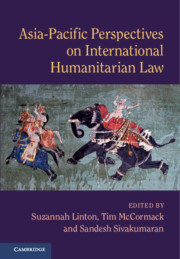Book contents
- Asia-Pacific Perspectives on International Humanitarian Law
- Asia-Pacific Perspectives on International Humanitarian Law
- Copyright page
- Contents
- Figures and Tables
- Contributors
- Foreword
- Foreword
- Acknowledgements
- Editors’ Note
- 1 Introduction: Asia-Pacific Perspectives on International Humanitarian Law
- Part I Interviews
- 2 Negotiating the Two Additional Protocols of 1977
- 3 The Adjudication of International Humanitarian Law
- 4 Contributions to International Humanitarian Law in the Philippines and Beyond
- 5 Reflections on Law, Practice, Politics, Diplomacy and Humanity
- Part II Development of International Humanitarian Law
- Part III Practice and Application of International Humanitarian Law
- Part IV Implementation and Enforcement of International Humanitarian Law
- Part V Looking to the Future and Enhancing Compliance with International Humanitarian Law
- Glossary of Publications
- Alphabetical Glossary of Cases and Decisions
- Chronological Glossary of Cases and Decisions
- Treaties and Other International Instruments, Resolutions and National Documents with an International Dimension
- Chronological Glossary of National Legislation and Secondary Instruments
- Peace Agreements and Communiques
- Abbreviations and Translations
- Index
2 - Negotiating the Two Additional Protocols of 1977
Interview with the Right Honourable Sir Kenneth Keith
from Part I - Interviews
Published online by Cambridge University Press: 18 October 2019
- Asia-Pacific Perspectives on International Humanitarian Law
- Asia-Pacific Perspectives on International Humanitarian Law
- Copyright page
- Contents
- Figures and Tables
- Contributors
- Foreword
- Foreword
- Acknowledgements
- Editors’ Note
- 1 Introduction: Asia-Pacific Perspectives on International Humanitarian Law
- Part I Interviews
- 2 Negotiating the Two Additional Protocols of 1977
- 3 The Adjudication of International Humanitarian Law
- 4 Contributions to International Humanitarian Law in the Philippines and Beyond
- 5 Reflections on Law, Practice, Politics, Diplomacy and Humanity
- Part II Development of International Humanitarian Law
- Part III Practice and Application of International Humanitarian Law
- Part IV Implementation and Enforcement of International Humanitarian Law
- Part V Looking to the Future and Enhancing Compliance with International Humanitarian Law
- Glossary of Publications
- Alphabetical Glossary of Cases and Decisions
- Chronological Glossary of Cases and Decisions
- Treaties and Other International Instruments, Resolutions and National Documents with an International Dimension
- Chronological Glossary of National Legislation and Secondary Instruments
- Peace Agreements and Communiques
- Abbreviations and Translations
- Index
Summary
The Right Honourable Sir Kenneth James Keith ONZ, KBE recently completed his term as the first permanent judge of the International Court of Justice from New Zealand. He has enjoyed a distinguished and varied career as an academic, government lawyer and judge. Sir Kenneth was a faculty member of Victoria University Wellington Law School from 1962 to 1964 and from 1966 to 1991. He served in the New Zealand Department of External Affairs in the 1960s, as a member of the UN Secretariat from 1968 to 1970, as Director of the New Zealand Institute of International Affairs and as President of the New Zealand Law Commission. From 1996 to 2003, Sir Kenneth was a Judge of the Court of Appeal of New Zealand and a member of the Judicial Committee of the Privy Council. He was subsequently one of the inaugural appointments to the new Supreme Court of New Zealand following the abolition of appeals to the Privy Council. Sir Kenneth was a member of the New Zealand delegation to the 1974–1977 Diplomatic Conference to negotiate the Additional Protocols to the Geneva Conventions. Tim McCormack interviewed him in Wellington, New Zealand in July 2018.
- Type
- Chapter
- Information
- Publisher: Cambridge University PressPrint publication year: 2019



